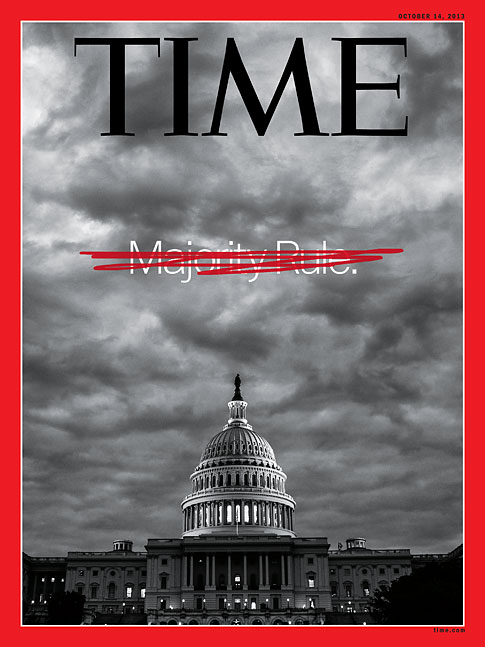
(2 of 6)
Of Boehner's 231 allies, 205--that's 89%--are no more likely to see a serious Democratic challenge next year than see their paychecks disappear in a government shutdown. They exist in a one-party world. Their greatest fear is a primary campaign challenge from a candidate to the right. Sidling further and further toward the far flank, they eventually stake their flag on zealotry. As New Mexico Republican Congressman Steve Pearce told the New York Times near zero hour, "At times, you must act on principle and not ask what cost, what are the chances of success." He may just not care that President Obama won New Mexico by 10 percentage points; in Pearce's district, Obama lost by a landslide.
With constituencies so divided and incentives so misaligned, the country has been set up, quite literally, to fail. And the President--who is elected by the entire country--seemed content to be a bystander to the game. At the White House, Obama's aides studied the polls and saw in Boehner's brinkmanship an exercise in self-harm. The GOP quest to reverse Obamacare was front and center in 2012 and failed. If the opposition wanted to die again in the same trench, Obama was content to let it. Hours after the Washington zoo locked its gates and national parks closed across the country, Obama's top opinion tracker, David Simas, gleefully tweeted out the latest results. "Two new polls. Same findings. Independents sour on GOP," he crowed.
For some Republican strategists, this was the nightmare foreshadowed by the exit polls of 2012: a party marching resolutely away from the center of public opinion. "The alarm bells are starting to go off for me," says Ari Fleischer, George W. Bush's former press secretary, who recently co-authored a report for the Republican National Committee recommending a swift turn to the middle. "If you want to appeal to the base in 2014"--a midterm election when turnout will probably be light--"I get it," he says. "But if you want to appeal to the base in a presidential year," the hard-line position "is going to lead to doom and failure going into 2016."
Even as the shutdown begins to take its toll, the next battle is looming. By Oct. 17, Congress must pass a bill to lift the federal debt limit or risk economic calamity. Failure to do so would put the government on the brink of default, an event long considered so unthinkable that economists say they can't predict the consequences. One optimistic scenario is that Boehner's decision to hold the line on a shutdown will release the pent-up frustrations among members of his fractious conference, paving the way for a big compromise. But it could also embolden them. Some figures in the Republican Party are making a case that not raising the debt ceiling would not be catastrophic. Both parties are bracing for an even higher-stakes brawl at a time when it is not clear anyone has the ability to lead the country. "It's like the car crashed," one GOP lobbyist said as the weirdness unfolded, "but no one knew it until they went to use the car."
The Republican Rebellion
